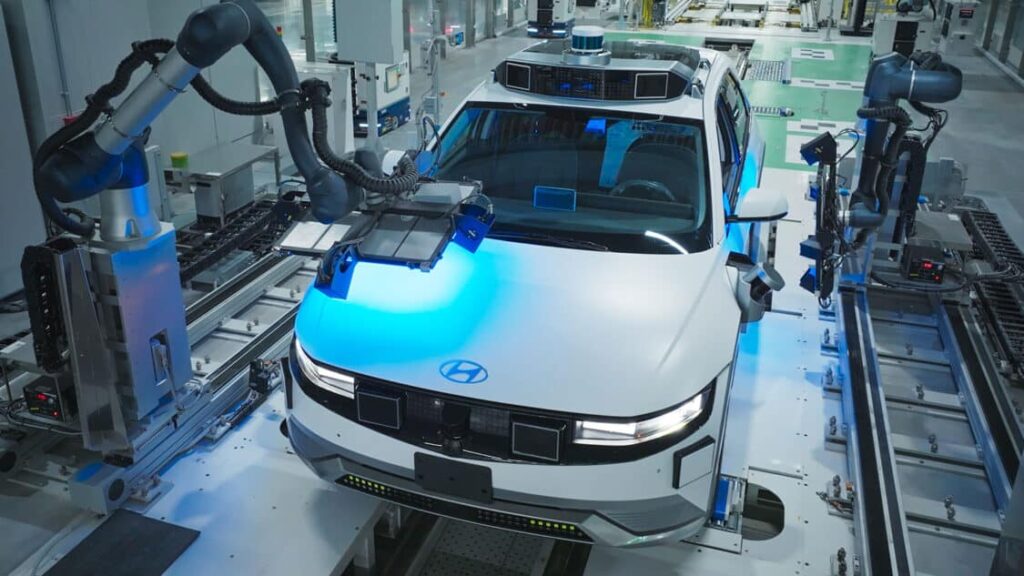Hyundai’s First U.S. EV Plant Fast-Tracked to Gain Electric Vehicle Tax Credit in 2024
Despite not currently qualifying for the electric vehicle tax credit in 2024, Hyundai Motor (including Kia and Genesis, owned by Hyundai) surged past EV rivals Ford and GM to become the second-largest EV seller in the U.S. Because of a loophole in the rules, Hyundai qualifies for the $7,500 tax credit for EVs through leases. Hyundai and Kia accounted for about 8% of passenger EVs sold (117,000 units) in the U.S. in 2023.
Georgia Is Home to the Hyundai Motor Group Metaplant America

Hyundai Motor Group Metaplant America is expected to open as early as October 2024, three months ahead of schedule. In the meantime, Hyundai said it will source batteries from other U.S. plants to bridge the gap until the Georgia location opens. Once in operation, Hyundai’s Metaplant will be able to build up to 300,000 EVs annually. Hyundai representatives said that the plant’s production can be expanded to 500,000 if needed.
Six electrified models across the Hyundai, Kia, and Genesis brands will be assembled at Hyundai Motor Group Metaplant America. These models will include Hyundai’s first three-row electric SUV, the Hyundai IONIQ 7. Hyundai’s innovative IONIQ 7 is expected to debut this year, with production of the vehicle beginning in 2025.
Hyundai Is One of the EV Makers Accelerating EV Production While Rivals Cut Back
Hyundai is one of the EV makers accelerating EV production, while rivals such as Ford and GM are delaying EV initiatives and pulling back on production. Both Ford and GM have recently announced upticks in sales of hybrids and have therefore planned to increase the production of these vehicles in 2024 while decreasing their battery-electric vehicle production at the same time. EV critics point to the decreases by Ford and GM as proof that the EV revolution is slowing or dying.
Nothing could be further from the truth, as Cox Automotive predicted that EV adoption in America will reach 10% in 2024 and is continuing to grow rapidly despite various adoption barriers. The gains enjoyed by Hyundai, and others increasing their EV market share, offset losses by those such as Ford and GM, creating net gains in the EV industry.
A Significant Boost to EV Adoption Comes From the Federal Electric Vehicle Tax Credit in 2024
The federal electric vehicle credit became a point-of-sale discount in 2024. It is a significant and very effective step from the federal government to encourage American EV adoption. The credit has four basic goals: to stimulate domestic EV battery production, create jobs in America, avoid benefitting “Foreign Entities of Concern” (including China), and encourage American EV adoption.
Buyers may qualify for a $7,500 tax credit for an EV if the buyer purchases a new, qualified Hyundai EV or other battery electric vehicle (BEV) or PHEV (plug-in hybrid electric vehicle.) The credit offers up to $4,000 for a used PHEV or EV. Only a small number of vehicles currently qualify for the credits so far in 2024 due to strict rules about foreign production. EV industry experts predict that many more clean energy vehicles will qualify for the credits soon since companies are working hard to build up production in the U.S., as this example from Hyundai proves.
The Hyundai Motor Company Continues to Set Records

The Hyundai Motor Company, often referred to as Hyundai Motors but commonly known as Hyundai, is a South Korean multinational automotive original equipment manufacturer (OEM) headquartered in Seoul, South Korea. Hyundai Motor America began selling cars in the United States in 1986 with a single model: the Hyundai Excel. That year, Hyundai set a record for selling the most automobiles in its first year of business in the United States compared to all other car brands.
After initial problems with quality, Hyundai stepped up the quality while keeping prices low. This combination has captured a loyal following in America, with high sales numbers making it a significant part of the global automotive industry.
Currently, Hyundai offers a wide variety of electrified vehicles. These include:
2023
- Santa Fe Hybrid
- Nexo Fuel Cell
- Sante Fe PHEV
- Elantra Hybrid
- Sonata Hybrid
2024
- Kona Electric (one of the lowest-priced EVs in the U.S., although not currently qualifying for the 2024 electric vehicle tax credit)
- IONIQ 6
- Tucson Hybrid
- Tucson PHEV
- IONIQ 5
In January 2024, EV expert Loren McDonald, CEO of EVAdoption, predicted the top ten best-selling BEVs that will be sold in 2024. The predictions included model years 2023-2025. Hyundai-owned brand Kia made the list with its 2024 EV6, coming in at No. 9. The 2024 Hyundai IONIQ 5 was No. 5.
With Hyundai offering incentives, including a $7,500 special cash offer, the 2024 Hyundai IONIQ 6 undercuts competitors. Meanwhile, starting at $32,675, the 2024 Hyundai Kona Electric is currently one of the most affordable EVs in the U.S., even without qualifying for the electric vehicle tax credit here in 2024.
Hyundai made history last year by signing a deal to become the first brand to sell vehicles on Amazon. EVOLVE is Hyundai’s next-generation showroom on Amazon, launching later in 2024. Experts predict that this move will revolutionize the car-buying process in America, making it much easier and more seamless.
The company recognized the great success of Rivian’s direct-sales model, offering a set price online for each vehicle. Hyundai is not closing its dealerships to offer fully direct sales, but instead is adopting a highly successful component of the model: the set online price. This removes the time-consuming haggling process dreaded by car buyers when visiting dealerships. Automotive experts predict all other American OEMs will make similar deals soon with Amazon, other online sales platforms, or on their own websites.
Because of this innovation, the buying process is becoming easier. In most cases, a final trip to a dealership is still needed to go for a test drive. Signing the paperwork and taking delivery of the car are also completed at the dealership. However, even those parts of the process are changing.

Hyundai Is Trailblazing EV Leadership
Hyundai, as a leader in the EV market, can teach valuable lessons to other OEMs struggling with EV production and sales. The company produces high-quality vehicles at a low cost, which is important to EV adoption. Hyundai is one of the older OEMs that made a name for itself producing internal combustion engine (ICE) vehicles.
Some companies have struggled with the complexity of switching over production from ICE to EV and then back to more ICE and hybrids, depending on current demand. Hyundai has maintained a strong commitment to producing EVs, which is paying off as the EV revolution continues to grow in America and around the globe. Hyundai will benefit from these wise choices through growing sales, as consumers will recognize the brand as being important to reducing greenhouse gasses and fighting climate change, creating a healthier environment worldwide.

Electric Vehicle Marketing Consultant, Writer and Editor. Publisher EVinfo.net.
Services